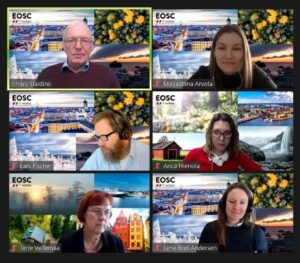EOSC-Nordic Policy Workshop, together as EOSC enablers
An integral part of the EOSC-Nordic project is to provide insights from the Nordics and Baltics to the policymakers and funders for considerations on policy harmonisation and EOSC development.
On 9th March, about 140 policymakers and stakeholders from Baltics and Nordics gathered together virtually in the second EOSC-Nordic Policy Workshop to discuss open science policies, Nordic and Baltic collaboration, and EOSC development. The project had done the groundwork for the workshop during the past year on mapping existing practices, policies, collaboration models, and cross-border activities in the Nordics and Baltics, which led to fruitful discussions between project representatives, policymakers, funders, and other stakeholders.
The workshop was organised around three main sessions. In the introductory session, the hosting countries Latvia and Estonia, together with EOSC-Nordic, presented the development and harmonization of the Open Science policies. The initial presentations set the scene for the later discussions of the day by pointing out the ambition of the region to promote open science. Open science cannot be dealt with only nationally, but the borderless nature of research needs to be considered.
Aleksandrs Martiņš Blūms from the Latvian Ministry of Education and Science presented the recent developments in Latvia for establishing a national strategy on open science. Martin Eessalu from the Estonian Ministry of Education and Research stated that because the research ecosystem doesn’t acknowledge state borders, sufficient cross-border harmony in the policy approach is needed. Later on, Per-Olov Hammargren noted in his presentation that according to EOSC-Nordic studies, only one Nordic or Baltic country currently has a policy acknowledging the facilitation of cross-border research where national e-infrastructure is promoted to international users.

After the morning’s presentations, the panel discussion turned on EOSC development and solutions to challenges. During the panel, EOSC-Nordic representatives gave pitches on FAIRification, cross-border service delivery, and interoperability from researchers’ and service provider’s views. The panel of Nordic and Baltic EOSC stakeholders sought a common understanding of the presented challenges and discussed potential solutions.
Much attention in the discussions was paid to the need for training and skills development related to data management. All the levels should be involved in making sustainable data management possible; universities, funders, infrastructures – collaborating nationally and across borders. Also, EOSC could have an important role in ensuring that progress takes place.
Regarding cross-border service provision, the panelists noted that all levels of the service delivery chain – mandates, policies, governance, collaboration, and funding models – need to support cross-border service provision. From the researcher’s point of view, it was pointed out that services appear like a complex ecosystem, where strategic plans support cross-border collaboration. Still, at the same time, researchers from other countries cannot use other countries’ services. Common approaches are needed.
The third session was a panel discussion on Nordic and Baltic collaboration in the context of EOSC, and the panel consisted of funders’ representatives and policymakers. The Nordic and Baltic countries have a long history of cooperation, and the aim was to discuss which added value this collaboration can bring to the EOSC development. What kind of role Nordic/Baltic countries can take?
From the discussion, it became clear that Nordic and Baltic collaboration brings many benefits, and the collaboration we are doing in EOSC-Nordic was seen as worth doing. The long history of collaboration ensures that we understand each other, and knowing each other even better makes it easier to develop things together. Panelists viewed that the Nordics and Baltics could impact the European level as the region is small enough to test things and then provide the lessons learnt for the European collaboration. Sharing the lessons learnt is a good opportunity for the Nordics and Baltics to contribute to the European level developments.
See the presentations and the recording of the event from our earlier post.
Authors Maijastiina Arvola, CSC and Päivi Rauste, CSC